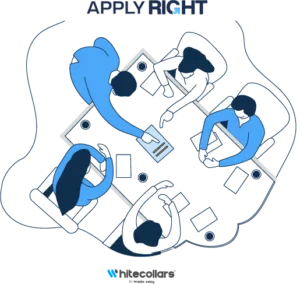No Packages on the cart
Career Development vs. Growth: Finding the Right Balance
Imagine this: you’re in a bustling office, sipping a cup of lukewarm coffee while wondering if you’re on the right path in your career.
You’re crushing deadlines and your performance is optimal, yet it feels like you’re running on a treadmill and not really moving forward. This is where many people pause to wonder, “Am I focusing on my career development or growth?”
While these two terms often get tangled up, they’re quite distinct. In this post, we’ll unravel these two concepts and understand how they could affect your career.
What’s the Difference Between Career Development and Growth?
Before diving deeper, let’s cover the basic differences first:
| Career Development | Career Growth |
| A structured process that involves improving skills, gaining new experiences, and expanding one’s knowledge base. | The natural progression in job titles, responsibilities, and often, financial rewards. |
| Involves planning, training, mentorship, and long-term goals. | Includes promotions, new job roles, and salary increments. |
| Requires active efforts like consulting with a career coach online or taking courses. | Can sometimes happen passively as one gains seniority and experience. |
In simple terms, career development is the journey, while growth is the outcome. Think of it as if you’re taking the scenic route versus going straight to the destination.
The Importance of Balancing Development and Growth
Focusing solely on one aspect could lead to stagnation or burnout. When you strike a balance between career development and growth, you not only move up the ladder but also become better equipped to tackle the responsibilities that come with it.
Why You Need Career Development
Here’s how career development could affect you professionally:
- Skill enhancement: sharpening your skills through continuous learning (like taking an online course on a relevant skill) increases your marketability.
- Personal fulfillment: constantly working on development boosts confidence and overall job satisfaction.
- Preparation for bigger roles: when you’re preparing for a job interview, particularly one that will set you up for a managerial position, having a solid foundation in your field can set you apart from other candidates.
Why You Need Career Growth
This one aspect of your career also comes with its own set of benefits:
- Increased recognition and responsibility: promotions often bring along opportunities to lead projects, formulate effective strategies, and mentor juniors.
- Financial stability: with growth, you’ll get significant salary increments, which will further contribute to financial goals like buying a house or funding personal ventures.
- Motivation: achieving new milestones gives a tangible sense of accomplishment, which keeps you searching for the next big step in your career.
Identifying When to Focus on Each
Here’s a practical approach to determine when to prioritize development over growth. Let’s explore these scenarios:
| Focus on career development When | Focus on career growth when |
| You’re feeling stagnant in your role. | You have mastered your current responsibilities. |
| You’re looking to change industries or roles. | There are visible opportunities for promotions. |
| You’re planning to switch jobs and need to polish your skills or get certifications. | You’ve gained new skills and are ready to apply them in a higher role. |
Creating Your Personal Strategy
Finding the balance between career development and growth isn’t just about checking off boxes—it requires a designated approach that fits your unique journey.
Here’s how to create a personal strategy to ensure you’re progressing effectively in both areas.
- Assessment Phase
Before diving into career plans and setting up a roadmap to your professional goals, it’s essential to conduct a thorough self-assessment. Think of this as your career compass, guiding you in the right direction.
When it comes to professional skillsets, take stock of where you currently stand in your career. Here are some critical areas to examine:
- Current skill level and competencies: identify the strengths you can leverage and the skills you need to improve.
- Industry-specific knowledge gaps: check if there are emerging trends or technologies in your industry that you haven’t yet explored.
- Professional network strength: evaluate the relationships you’ve built. Don’t underestimate the power of connecting with mentors, peers, and leaders in your field.
- Career trajectory and goals: reflect on your career path. Are you advancing towards your long-term vision, or is there a misalignment that occurred at some point?
- Competition analysis: understand where you stand compared to others in your field. This could help highlight areas for improvement and new opportunities.
Note that it’s not all about work; your personal life plays a key role in your career decisions. Think about these factors while you assess the situation:
- Core values and beliefs: check if your career choices align with what you value most in life.
- Life satisfaction levels: are you genuinely satisfied with your work-life, relationships, and personal achievements?
- Work-life balance status: take a hard look at how you’re managing time between work and personal commitments.
- Personal relationship quality: healthy relationships can support career development, while strained ones can bring it to a halt.
- Health and wellness state: Your physical and mental well-being should be your top priority. Overexerting yourself rarely leads to long-term success.
- Goal Setting Framework
Once you’ve completed your assessment, it’s time to establish a concrete plan using the SMART+ method. This framework ensures that your goals are realistic, doable, and correspond with your values. Here is a breakdown of this framework:
Specific:
- Define exact outcomes: set clear objectives. For example, if your goal is to become a project manager, define what that looks like in terms of responsibilities and skills.
- Include measurable metrics: try to use metrics to gauge progress, such as “complete a leadership course in three months.”
- Set clear timelines: establish deadlines for each goal to keep your pace up.
Measurable:
- Establish key performance indicators (KPIs): identify clear success criteria for each goal. This could involve achievements like obtaining a certification or receiving constructive feedback from mentors.
- Utilize progress tracking systems: use apps and journals to track your growth. You can even check in with a career coach to track your growth.
- Define success criteria: be clear about what achieving the goal means for you. It could be as simple as securing a new role or promoting your public speaking skills.
Achievable:
- Assess resource requirements: determine what resources you need, like additional training, budget for courses, or time investments.
- Consider current commitments: ensure you’re not overloading yourself and slowly experiencing burnout.
- Plan for potential obstacles: identify challenges that might arise and think proactively of strategies to solve them.
Relevant:
- Align with career aspirations: your goals must lead you closer to your desired career path, not what you think is a good career path in general.
- Connect to personal values: goals that resonate with your core values will be even more motivating.
- Support long-term vision: Ensure short-term goals contribute to your overall career development plan.
Time-bound:
- Set realistic deadlines: create strategic timelines that push you forward without overwhelming you.
- Create milestone checkpoints: break large goals into smaller milestones. This will assist in maintaining focus and measuring progress incrementally.
- Allow for adjustment periods: life can be unpredictable. Thus, give space for some flexibility to rework your plan if required.
+ Value alignment:
This final step ties it all together by ensuring that your goals resonate with who you are and what you care about. This is how you achieve this:
- Personal principles: conform your career moves with your beliefs. If community involvement is essential to you, for example, seek roles that allow for social contributions.
- Life goals: consider how career plans support your life goals, like starting a family or achieving financial independence.
- Family considerations: think about the impact your career choices will have on your family and close relationships.
- Health and wellness: remember that a great career is only worthwhile if it supports your health and happiness.
Practical Steps to Balance Both
Now that you have assessed your unique situation, it’s time to put your plans into actionable steps:
- Invest in Continuous Learning
You can strike a balance between growth and development by constantly improving your skills. This doesn’t just mean obtaining certifications; it includes improving soft skills like communication, leadership, and problem-solving.
- Leverage Opportunities at Work
Volunteer for cross-department projects to expand your expertise. When the time comes for that big promotion, your employer will remember your versatility and willingness to go over and beyond.
- Evaluate Your Progress Regularly
Reassess your journey every 6-12 months to ensure that you’re on the right track for your goals. If it feels like you’re achieving little to no growth, it might be time to reassess your development plan and consult a career coach.
- Consult a Career Coach Online
A professional can help you map out a strategy that matches your development with growth opportunities. To that end, they’ll assist you in different aspects, including fine-tuning your job application process and teaching you how to write CV? that stands out.
Career Development Mistakes to Avoid
When balancing career development with growth, it’s essential to avoid common pitfalls such as the following:
- Overvaluing titles over skills: while growth is rewarding, it shouldn’t come at the expense of neglecting necessary skill upgrades.
- Relying solely on passive learning methods: while watching endless YouTube tutorials is beneficial, it should be complemented by active methods such as online courses. In addition, you must actively apply what you learn.
- Not tailoring your job application: don’t use the same generic resume for every application. Your CV for each job you apply to must be unique in a way that synergizes with the vacancy. Doing so will showcase that you’re genuinely invested in the position.
If you’re preparing for a job interview, practice scenarios with a trusted friend or mentor. Sometimes, a little mock interview session can shine a light on what you need to work on.
When Should You Seek External Help?
If you’re feeling stuck despite your consistent efforts, it might be time to seek guidance from a career coach. They can offer valuable insights into areas you may have overlooked and help you bolster your approach to a successful career development journey.
The following are scenarios where a career coach might help:
- Transitioning to a new role or industry: they can guide you in preparing for a job interview in a new domain.
- Resume writing: coaches offer customized advice on how to write a Resume that resonates with recruiters.
- Strategic career planning: a coach can help you develop an expensive plan that combines skill-building and growth opportunities effectively.
Sample Plan: Balancing Development and Growth
Here’s a simple template you can use to create a personalized plan:
| Category | Action Steps | Timeline |
| Career Development | Take a leadership course. | 3 months |
| Work on public speaking skills. | 2 months | |
| Schedule meetings with a career coach online. | Ongoing | |
| Career Growth | Seek new responsibilities in current role. | Next quarter |
| Prepare for a job interview for a management role. | 4-6 weeks | |
| Refine your job application. | 2 weeks |
Elevate Your Career Development and Growth with ApplyRight
Don’t settle for mediocrity. Advance your career development and growth with ApplyRight’s expert services. Our tailored guidance will help you refine your job application, enhance your interview skills, and gain valuable industry insights.
Take charge of your career journey. Whether you’re transitioning roles or seeking promotions, ApplyRight is here to support you.Ready to unlock your untapped potential? Call ApplyRight today and discover how our specialized services can help you land the job you’ve always dreamed of!
Related posts
In today’s rapidly evolving job market, navigating one’s career path can be a daunting task. Whether you’re a fresh graduate stepping into the professional world... Continue reading






Add comment